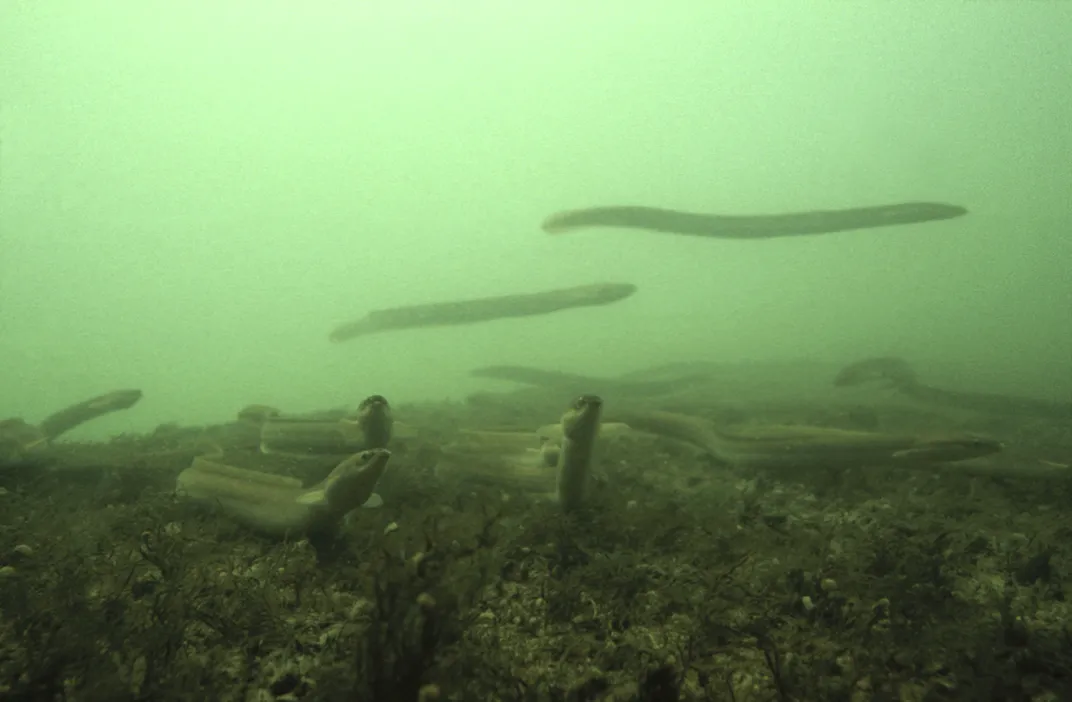Eels Are Victims of Noise Pollution
Critically endangered European eels get distracted by man-made noise, making them more likely to get eaten by a predator
:focal(3598x816:3599x817)/https://tf-cmsv2-smithsonianmag-media.s3.amazonaws.com/filer/ce/3d/ce3d5f71-009e-4f3d-a10e-94cdb0ecc2a6/eel.jpg)
Noise pollution isn’t just a problem for humans living in busy cities or sharing a wall with raucous neighbors. Man-made noises take a toll on animals, too. Birds change their songs when they find themselves in urban centers or next to rumbling highways, for example, and jarring noises made by boats or underwater explosions can cause fatal accidents for whales and dolphins.
According to new research published in the journal Global Change Biology, critically endangered European eels also belong on the list of human noise’s victims.
Researchers from the University of Exeter and the University of Bristol discovered this when they investigated how man-made noise might impact an animal’s ability to evade predators. The logical thinking is that animals won’t hear someone sneaking up on them if there’s a blaring noise in the background, or that they might be distracted enough by those sounds to not notice impending danger. European eels—which have a long history of laboratory studies but are struggling to survive in their native habitat in rivers, shipping channels and along coasts—would serve as a good test subject to investigate this question, the team decided.
The researchers began the study with lab tests in which they individually exposed 48 eels to two-minute recordings of ships passing through a harbor, or else to control noise of the same harbor without the ships. Then, they used a well-established predator stand-in method called “the looming stimulus approach,” which mimics a real-world predatory strike by using a model fish on a swinging pendulum.
They recorded the eels’ behavior with video cameras and later analyzed the footage for signs that the predator had startled the eel. They then measured the time it took for the eel to notice the predator after the threat had been introduced into the tank. In a second experiment, they mimicked a predatory pursuit by chasing eels with a hand net through a watery maze, which was again subject to either control noise or rumbling ship noise.

The results didn’t bode well for the eels. When surrounded by ship noise, eels were half as likely to respond to a predator’s ambush than they were under normal circumstances. Those that did react to impending death did so at rates about 25 percent slower than usual. And when the net-cum-predator gave the eels a chase, those terrorized animals were caught twice as often when conditions were noisy.
The team decided to dig into some of the physiology behind these findings, and discovered that—not unlike the human reaction to loud, irksome noises—eels simply become very stressed out when exposed to clamor. They filter water more quickly than normal (perhaps the eel version of hyperventilation?) and their metabolic rate increases. They also become clumsier, the team found, loosing some of their right-left movement coordination.
"Our findings demonstrate that acute acoustic events, such as the noise of a passing ship, may have serious impacts on animals with direct consequences for life-or-death behavioral responses,” Stephen Simpson, a senior lecturer at the University of Exeter and lead author of the study, said in a statement. “If these impacts affect whole populations then the endangered eel—which has seen a 90 percent crash in abundance over the past 20 years due to climate change—may have one more problem to deal with as they cross busy coastal areas.”
The team suspects that eels are not alone in their detrimental reaction to noise, although more studies are needed to confirm how other aquatic animals (including the predators themselves) deal with this pervasive form of pollution. Additionally, the researchers also thinks that eels’ abilities to forage or travel might be impacted by noise, although they point out that those behavioral changes probably aren’t as dire as the predator effect since “there is no way to compensate for being eaten after the disturbance goes away.”
/https://tf-cmsv2-smithsonianmag-media.s3.amazonaws.com/accounts/headshot/Rachel-Nuwer-240.jpg)
/https://tf-cmsv2-smithsonianmag-media.s3.amazonaws.com/accounts/headshot/Rachel-Nuwer-240.jpg)